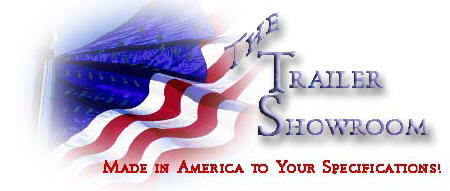Driving an automobile on the roads is risky. Imagine having a trailer with heavy cargo attached to your vehicle. That is all the more challenging because you have to manage your vehicle, the trailer, and the weighty cargo. Therefore, you must adopt towing safety tips to ensure an efficient, safe, and secure towing.
Improper towing can lead to serious accidents, causing injuries, deaths, or damage to vehicles and cargo. To avoid these potentially devastating situations, newcomers and experienced drivers must adhere to the safety guidelines. These trailer towing tips ensure the safe hauling of cargo and the safety of other people and vehicles on the road.
This blog focuses on seven trailer towing safety tips for a smooth and secure haul. So, get on this ride confidently and follow the best safety practices for your and others' peace of mind.
Trailer Towing Safety Tips
1. Preparing Your Cargo Trailer for Safe Towing
One important trailer safety tip is preparing your cargo trailer for the ride. Whatever your trailer type is - enclosed, open, gooseneck, utility, or any other - it must be ready to hit the road. So, you must ensure all its parts are properly working. For this, you must check the following:
- Inspect if the hitch, coupler, and safety chains are properly and securely connected.
- Check the tire pressure, tread depth, and overall tire condition to prevent tire bursting or blowouts.
- Ensure the braking system is not worn, functioning correctly, and controlled for proper stopping force after applying brakes.
- See if all the necessary lights on the trailer are not broken and are clearly visible.
2. Proper Trailer Hitching & Weight Distribution
Selecting the right hitch for the trailer is a vital towing safety tip. You can choose the hitch size and type based on the cargo's weight capacity and trailer type. Single axle trailers typically come with a 1-7/8" hitch, while tandem axle trailers typically come with a 2-5/16" hitch assembly. Of course, gooseneck and fifth wheel hitches come with their respective hitch types.
While loading the trailer, place heavier cargo in the front and lower levels, followed by the lighter equipment above it and at the rear of the trailer. If the weight distribution is improper or the load shifts inside the trailer, it sways, impacting your control over the vehicle.
In such situations, you can use weight distribution hitches to reduce the tongue weight and spread it on the other axles of the trailer. Your towing vehicle gets the necessary weight to ensure straight driving and safety. Thus, you can easily handle heavy loads, which remain balanced during the transit, leading to better towing performance.
3. Driving & Handling Best Practices for Towing Safety
Adhering to road speed limits is a key trailer-towing safety tip. Driving at high speeds can cause your trailer to sway, and sudden braking at high speeds can be dangerous for you and your cargo. So, you must drive at a controlled pace, allowing you to apply brakes and stop the vehicle smoothly. Maintaining a safe distance between your vehicle and other vehicles is also important, providing extra room to brake.
Low speeds and extra braking distance also prevent trailer sway. You can maneuver easily through turns and curves, ensuring trailer safety. While driving, you must observe the wind conditions. Based on the wind direction and strength, keep adjusting the speed of your trailer to prevent instability and swinging.
4. Trailer Sway Prevention and Stability Tips
Preventing the swinging and swaying of the trailer is a vital towing safety tip that you mustn't ignore. Your trailer might sway due to any of the following reasons:
- Movement of the load inside the trailer
- Tire inflation and suspension problems
- A slight increase in tongue weight
- Improper coupling of the towing vehicle and the trailer
If you detect any of these problems, take immediate measures to solve or prevent them altogether. A preferred solution is sway control bars that help control the vehicle while applying brakes and during turns. These anti-sway devices also adjust the weight distribution by shifting the heavy weight forward and keeping the rear part of the trailer lighter. Thus, this anti-sway bar keeps the towing vehicle and trailer in line and maintains stability during transit.
Helpful Reads:
How to Customize Your Trailer for Maximum Efficiency
The Ultimate Trailer Maintenance Guide - Tips & Checklist
A Step-By-Step Guide To Using Car Hauler Trailers For Safe Vehicle Transport
5. Parking, Reversing, and Maneuvering Your Trailer
Parking, reversing, and maneuvering your towing vehicle and trailer are also critical for towing safety. One wrong step can lead to unforeseen situations, harming you, your cargo, or other vehicles on the road. So, adopt the following trailer towing safety tips:
- While reversing, the towing vehicle and the trailer move in opposite directions. So, if you want the trailer to go right while backing, turn the steering wheel in the left direction.
- You must also use mirrors and spotters wisely to guide you perfectly during maneuvering and reversing.
- Be sure that there are no obstructions when parking or turning a trailer, especially on inclined or uneven surfaces.
- Avoid accelerating during turns and hard braking so you don't lose control of the trailer. Apply brakes gradually and drive slowly to control the entire truck and trailer combination.
6. Emergency Preparedness & Common Troubleshooting
Even if you take all the precautions, you might be caught amid emergencies. These can involve flat tires, minor accidents, mechanical failures, or cargo damage due to shifting. So, prepare for emergencies with different tactics to overcome them.
Even if you take all the precautions, you might be caught amid emergencies. These can involve flat tires, minor accidents, mechanical failures, or cargo damage due to shifting. So, prepare for emergencies with different tactics to overcome them.
You must also have an emergency kit and a first-aid kit. The emergency kit will have all the necessary equipment like a spare tire, jack, warning triangles, flashlights, chains, extra batteries, tie-down straps, and other tools. The first-aid kit must have bandages, wipes, ointments, gloves, medicines, and a first-aid guide to help you deal with personal health concerns.
You must also be aware of the roadside assistance services in your state. Knowing when to pull over and call these services for adequate support is crucial.
7. Legal Requirements & Compliance for Safe Towing
A trailer towing safety tip commonly ignored is compliance with legal requirements in the U.S. If you ignore any of these, you might not even be allowed to start your cargo towing task.
These laws relate to the following aspects:
- Dimensions and weight capacity of the trailer
- Additional elements in your vehicle to allow towing a trailer
- State permits if you have to cross another state
- Restrictions on transportation of specific cargo
- Any specifications on cargo for particular roads, tunnels, and bridges
- Proper insurance coverage for the vehicle and towing task
Violating any of these can lead to the restriction, suspension, or ban of your towing operations. So, you must comply with these legal mandates from the federal and state-level authorities to avoid non-compliance penalties.
Conclusion
Follow these trailer towing safety tips to protect yourself, your vehicle, other road users, and other vehicles from potential damage. These tips can convert your bumpy ride into a smooth experience. But before that, ensure you buy a trailer that fits your towing needs and industry domain.
Trailershowroom.com provides different types of cargo trailers to customers across the U.S. You can share your transportation needs with us, and our team will suggest the best towing solution for efficient transit. We also help you with financing options to reduce your trailer financing stress.
Ready for a smooth, hassle-free, and safe cargo towing?
Check out our high-quality and safe custom cargo trailers at Trailershowroom.com.
FAQs on Trailer Towing Safety Tips
-
1. What is the best way to prevent trailer sway?
Anti-sway bars are the perfect solution to prevent swaying by keeping the heavy weight in front and down and the lighter weight at the rear end and on top. This lends stability to the journey.
-
2. How do I know if my trailer is hitched properly?
For proper hitching of the trailer to the towing vehicle, check the following:
- Tight coupler connection
- Be 100% sure that your trailer hitch size matches your tow vehicle's coupler size.
- Locking of the latch
- Crossed and connected safety chains
- Balanced weight distribution
- Alignment of trailer and vehicle
-
3. What are the most common mistakes in towing a cargo trailer?
The most common mistakes you can make in towing a cargo trailer include:
- Exceeding the trailer's towing capacity and dimensions
- Neglecting the braking system and tire pressure
- Loose connection between the trailer and vehicle
- Driving too fast and rough
- Incorrect weight distribution of the cargo on the trailer
-
4. Do I need a special license to tow a cargo trailer?
If you are towing for your personal use, including recreational equipment or personal belongings, you do not need to get a special license. Your driver's license works. The same is the case with light trailers where the vehicle's GCWR is less than 26,000 lbs. and the trailer's GVWR is less than 10,000 lbs. But when you tow for commercial reasons or with heavy loads, you must get a special commercial driving license. Since state-specific requirements differ, you must check with state authorities before engaging in such towing operations.
-
5. How do I calculate my towing capacity?
The towing capacity results from subtracting curb weight and payload capacity from your vehicle's gross combined weight rating (GCWR). Here, GCWR is the maximum allowable weight of your vehicle plus trailer, curb weight is the weight of your empty vehicle, and payload capacity is the maximum amount of weight you can add to the vehicle in the form of cargo and passengers.





